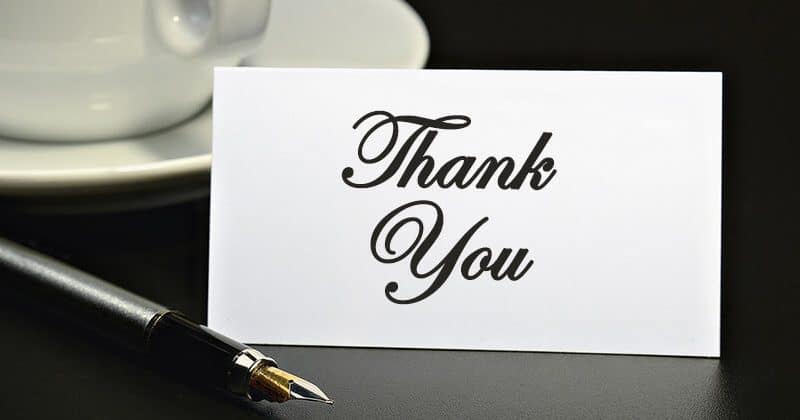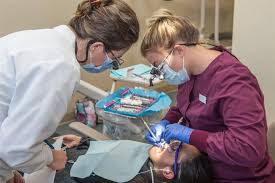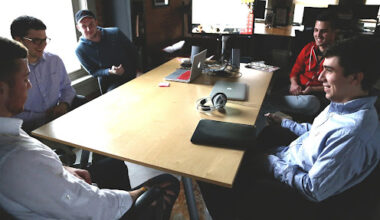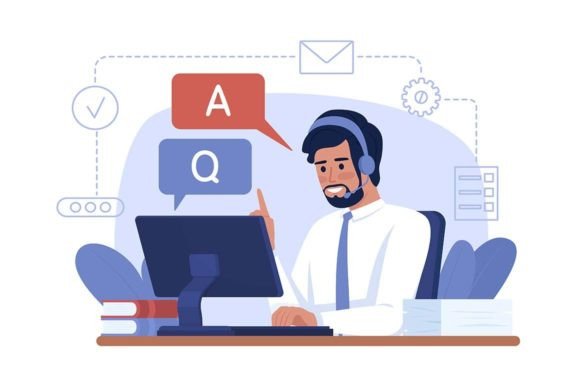You’ve just finished an interview for a job you’re quite interested in. You know you should thank your interviewers, but you’re stumped on what to say. How much information should you include? Should you send an email to every person you interviewed? And what is the most effective technique to follow up? For example, here are some pointers on how to write a handwritten thank you note and email after a virtual interview. I’ll also explain why writing a thank you note is important, even if it feels like a formality. Let’s see what to include in a handwritten thank-you letter or email after a virtual interview.
How to Write a Thank You Letter After an Interview
Let’s dissect the best thank you email or letter after an interview so you can write your own in no time! You must always follow up with an interview thank-you email within 24 hours of the discussion. Send a personalized thank-you letter or email to each of the people who interviewed you. Be honest, thank them for the opportunity, express your enthusiasm again, and remember to refer to what you talked about during the interview.
And here’s some evidence of how vital the thank-you email is in your job search:
- According to a recent survey, one in every five recruiters and hiring managers will instantly eliminate a candidate who has not written an interview thank you email.
- Furthermore, according to this report, 80% of HR managers believe thank you emails are beneficial in making the final hiring decision. Despite this—
- According to another CareerBuilder research, 57% of job applicants do not write thank you cards after an interview.
Any thank you email sent after a job interview puts you ahead of more than half of the competitors.
Here’s how to write a beautiful thank you email or letter after a virtual interview In 7 simple steps:
#1. Develop a distinct subject line
No puns or jokes, get to the point. It’s the only way to ensure that your thank you email is read.
Thank you email subject lines examples:
- Thank you so much, [Interviewer’s Name]!
- I thank your time and advice.
- Thank you for the interview yesterday.
- Thank you for the interview yesterday.
- Thank you!
#2. Start with a friendly greeting.
- Introduce yourself to the hiring manager by name.
- Send unique thank-you notes to each interviewer if you were interviewed by more than one person.
#3. Express your gratitude
- Since this is a “thank you” email, start with “thank you!”
- When expressing gratitude or admiration, be genuine and sincere.
- Demonstrate that you value the time the interviewers spent with you discussing the specifics of your position.
#4. State your interest in the position.
- During the interview, your prospective employer wants to ensure that you are a good fit for the organization. But…
- They also want to know that you are genuinely interested in joining. Make a note of it in your thank you an email.
- If the interview convinced you that the position is not for you, mention this in your thank-you email. The recruiting manager will appreciate your honesty, and you will save them time.
#5. Make an offer based on anything specific you discussed during the interview.
- Describe what interests you most about the role and explain why. This way, your email following an interview will feel more personalized.
- Mention your skills and experience and explain how you plan to put them to use to help your potential employer get what they want.
#6. Inform them that you may supply additional information and remind them of the response deadline.
How to end a thank you email after an interview?
The golden rule is to keep it short and polite. A brief paragraph like the one below will suffice:
If you require any extra information from me to help you make a decision, please do not hesitate to contact me. I’m looking forward to our call next week, as planned.
#7. End with a professional signature.
- Thank them once more.
- End with a “sincerely” synonym and your complete name.
- Fill up your basic contact information below, including your phone number and email address.
- Optionally, include other links (e.g. your LinkedIn, Twitter, or a personal website).
Thank You Email after Interview Example
An example thank-you email or letter following a virtual interview is shown below. You can send these as a typed or handwritten note if you like. For the time being, just know that you can use this example thank-you email or letter after an interview in either typed or handwritten form.
#1. Interview Thank You Email/Letter Example:
Good day, Interviewer’s Name>.
Thank you for taking the time to interview me <yesterday/Friday/etc>. I appreciated our talk regarding <specific topic you discussed> and it was great learning about the <Job Title> position overall.
It appears to be an intriguing opportunity and a career in which I may achieve and excel. I’m eager to hear any updates you may provide, and please don’t hesitate to contact me if you have any questions or concerns in the meanwhile.
Best wishes,
<Your First and Last Name>
#2. Interview Thank You Email or Letter Example:
Hello, Daniel.
Thank you for taking the time yesterday. I appreciated the interview and learned about how the team is growing and the new types of clients you’re attempting to recruit.
I’m certain that I can apply everything I’ve learned at <Current Employer’s Name> and succeed in your role, so I’d appreciate your comments when you have them.
In the meantime, please do not hesitate to contact me if you have any questions or concerns.
Best wishes,
Clark, Biron
#3. Example Interview Thank You Email/Letter:
Good day,
Thank you for taking the time to chat with me <yesterday/Friday/etc.> about the <Job Title> opportunity at <Company Name>. It was a pleasure speaking with you, and I learned a lot about the potential.
The details you provided about <Something specific about the job that interests you> sounded quite intriguing. I am convinced that my skills will enable me to enter and succeed in this post, and it is a position I would be eager to take on.
I eagerly await your response regarding the future steps, and please do not hesitate to contact me if you require any additional information.
Thank you one more.
Best wishes,
<Your First and Last Name>
The preceding example is a little lengthier and more formal. You might send this as a handwritten thank you letter or as an email following the interview.
Handwritten Thank You Note after Interview
Standing out from the crowd can be a useful tactic when applying for and interviewing for employment. Applicants that go out of their way to contact their interviewer after the interview and express gratitude can often make a good impression on their potential employer. Sending a timely and nice thank you note after an interview might highlight your greatest qualities before you even start a new job. We explain why you should write a handwritten thank you note after an interview in this section.
Why should you Send a Handwritten Thank-you Note after an Interview?
After an interview, sending a handwritten thank-you note or letter can show to a hiring manager or team that you are conscientious, courteous, and professional. When hiring for an open position, many hiring managers seek these qualities. Sending a handwritten thank you note might help you stand out from the crowd, especially if many people are applying for and interviewing for the same position. Respecting the interviewer’s time in a thank you note can be a solid first step toward a positive working relationship, and doing it by hand can show your willingness to pay personal attention to the jobs they assign you.
Tips on Writing a Handwritten Thank you Note after an Interview
Here are some additional pointers for crafting interview thank-you notes:
#1. Keep a business card handy.
If you have mostly spoken with your interviewer via email, make sure to request a business card before or after your interview. This will allow you to send them a handwritten thank you note without having to contact them again for their mailing address. Requesting a business card may also give your interviewer the idea that you are a forward-thinking individual, which may be a quality they seek in their staff.
#2. Be truthful and genuine.
Try to be sincere in your expression of thankfulness. Although you should always use professional language when interacting with your employer, a thank you note can be a fantastic approach to highlight how your personality will fit into the company culture. Being genuine in your writing might convey your genuineness as a person and as a possible employee.
#3. Write succinctly.
Use as few words as possible to express your gratitude for the interview opportunity while not leaving out any vital details. Employers typically want to know that you value their time, and writing concisely is one method to show this. One way to ensure that your writing is brief is to keep your observations short enough to fit on a notecard.
#4. Remind your interviewer of your strongest points.
Your thank you note is an excellent opportunity to remind your interviewer of your strongest qualities and why they should hire you. Consider sending one or two lines highlighting your greatest qualifications for the job. You might even briefly discuss how your qualifications and characteristics can aid in the resolution of a company problem or the advancement of the organization’s mission.
#5. Mention any details you may have overlooked.
Consider including a qualification or experience that you failed to mention in your interview in your thank you note. Make sure to do so briefly and coherently, and make it apparent how that detail will help you succeed in the role for which you are interviewing.
#6. Consider other helpful persons.
Consider sending a thank you note to anybody who assisted you during your visit to the company other than your interviewer. For example, if the receptionist assisted you in finding the interview room, served you a beverage, and then directed you to the best sandwich store for lunch, you should thank them in a note to your interviewer.
Why Is It Necessary to Send a Thank You Email or Letter After an Interview?
Aside from being a good gesture, sending a follow-up message after an interview has several benefits.
- It establishes a positive rapport with the interviewer (s)
- It allows you to stand out in a crowd.
- It’s an opportunity to show off your professionalism and interpersonal skills.
- It validates your interest in the position.
So should you send an email or handwritten thank you note or letter after an interview?
There are occasions when an email thank-you letter is preferable to a handwritten thank-you note and vice versa. There may even be times when sending both is appropriate. Finally, the format you choose is entirely up to you. The most important thing is to send a thank-you note after an interview.
How Long Do You Wait to Send a Thank You Letter After an Interview?
Within 24 hours. Send your thank you email a couple of hours after the interview if you know you were the final candidate to interview for the position or if the employer is making a speedy decision. Always submit your thank you note within 24 hours of the end of the interview.
How Do Know If Interview Went Well?
Here’s how to tell if an interview was successful.
- Your conversation used the allotted time.
- You met other members of the team.
- They tried to persuade you to take the job.
- They inquired about your preferred start date.
- Your interviewers gave you positive feedback.
- You were given a follow-up date.
- They inquired about other available positions.
- You have a good feeling about this.
Do Interviewers Like to Thank You Notes?
No, although it is recommended that you send a thank you email after each job interview. This shows to the employer that you value their time and, more significantly, that you are still interested in the position.
Do Interviewers Always Respond to Thank You Notes?
It is usual for interviewers to be overworked and unable to respond to every thank-you email they get. It is customary to write a thank-you email after a job interview to offer gratitude for the chance and to reiterate your interest in the position.
Is It Ok to Send Thank You Email 48 Hours After an Interview?
Yes! It’s never too late to send a thank you email after an interview, but sending one within the first 24 hours is preferable. If you missed the 24-hour deadline, please send one if you are truly interested.
Is a 30-Minute Interview Good?
Yes. If your interview lasted 30 minutes, it was a lot of time. For most job levels, hiring managers typically set aside approximately 30 minutes to interview an applicant. If you lasted 30 minutes, you know you answered the questions correctly.
What Should You Not Say at an Interview?
Here’s a list of things not to mention during an interview:
- Any negative information about a previous employer or job
- “I’m not sure.”
- Benefits, vacation, and pay discussions
- Make disparaging remarks about oneself
- Act if you’re not interested.
- Be the first to mention
What Are the Negative Signs of an Interview?
6 Signs of a Poor Interview That Indicates You Didn’t Get the Job
- The interviewer did not appear to be interested in you.
- The interview was abruptly terminated.
- There was no chemistry at all.
- You were stumped by the killer question.
- The interviewer did not inform you of the role.
- You did not ask any questions.
What Not to Say in an Interview Thank You?
What Not to Say in an Interview Thank You Letter:
- “I appreciate the opportunity to interview for this post.”
- “I believe my qualifications are perfect for this job.”
- “I apologize for the delay in responding to you.”
- “Please accept this present as a mark of my gratitude.”
- “I’m phoning to check in.”
Is It Unprofessional to Look at Notes During an Interview?
Yes, you may bring notes to an interview if they contain the questions you intend to ask your interviewer.
Do Interviewers Care If You Look at Notes?
Yes and no. It is appropriate to bring notes to a job interview if those notes include a list of questions you have prepared to ask your interviewers. Bringing this type of information to an interview shows the recruiter that you are genuinely interested in the position.
Related Articles
- 5 Employee Recognition Ideas for Remote Teams
- GRATITUDE AS A BUSINESS STRATEGY: Why Gratitude Is Important in Business
- Interview Confirmation Email: How To Write One (+Templates)
- Employee of the Month: Best Practices, Templates & Ideas
- Good Customer Service: Best improvement strategies (+free samples)






